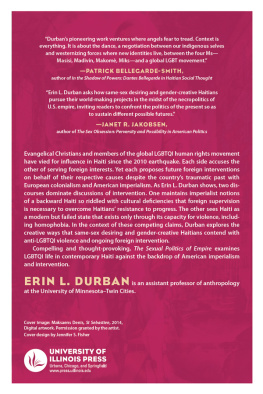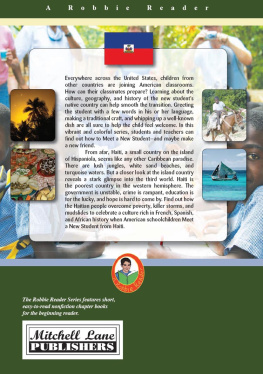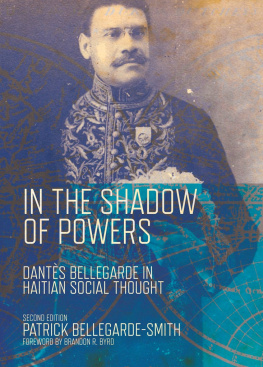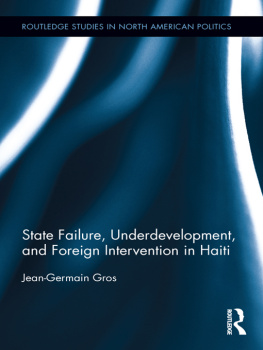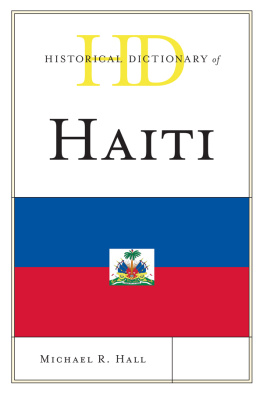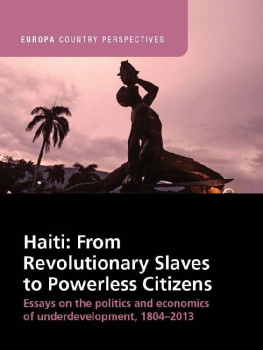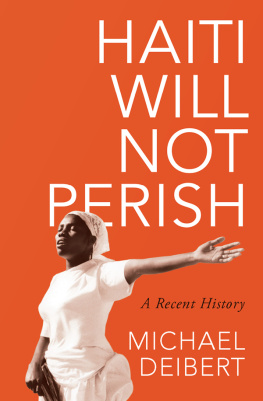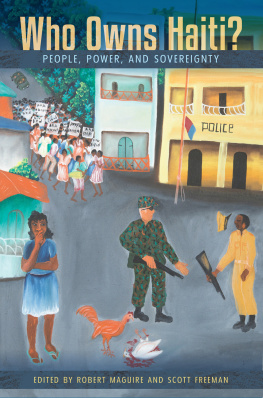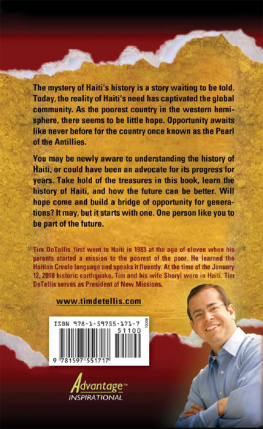NATIONAL WOMEN'S STUDIES ASSOCIATION / UNIVERSITY OF ILLINOIS PRESS FIRST BOOK PRIZE
A list of books in the series appears at the end of this book.
THE SEXUAL POLITICS OF EMPIRE
POSTCOLONIAL HOMOPHOBIA IN HAITI
ERIN L. DURBAN

2022 by the Board of Trustees
of the University of Illinois
All rights reserved
Publication supported by a grant from the University of Illinois Press Fund for Anthropology.
Library of Congress Cataloging-in-Publication Data
Names: Durban, Erin, author.
Title: The sexual politics of empire : postcolonial homophobia in Haiti / Erin L. Durban.
Description: Urbana : University of Illinois Press, [2022] | Series: National Women's Studies Association / University of Illinois First Book Prize | Includes bibliographical references and index.
Identifiers: lccn 2022021135 (print) | lccn 2022021136 (ebook) | isbn 9780252044755 (cloth) | isbn 9780252086847 (paperback) | isbn 9780252053801 (ebook)
Subjects: lcsh: HomophobiaHaiti. | HomophobiaReligious aspectsChristianity. | Sexual minoritiesHaitiSocial conditions. | bisac: SOCIAL SCIENCE / LGBTQ+ Studies / General | RELIGION / Sexuality & Gender Studies
Classification: lcc hq76.45.h2 d87 2022 (print) | lcc hq76.45.h2 (ebook) | ddc 306.76/6097294dc23/eng/20220518
LC record available at https://lccn.loc.gov/2022021135
LC ebook record available at https://lccn.loc.gov/2022021136
For the ti masisi, ti madivin, Black femmes, afro-punks, Voodoo Divas ( la Maksaens Denis), Voodoo Dolls ( la Assotto Saint), and revolutionary lovers in Haiti and its diaspora who have been envisioning and creating better worlds for all of us and For my loves (big and little)
Miranda Joseph and Fenniver Stronghold Durban-Albrecht-Joseph
ACKNOWLEDGMENTS
Jos Esteban Muoz once encouraged me to write the book that my fifteen-year-old self needed but did not exist in the world. This both is and is not that book. The book that I thought that I needed in the sense that Muoz meant was about the way that the drug wars and the U.S. prison industrial complex had shaped my life as a kid whose first steps were in the prison camp of the Leavenworth Federal Penitentiary. Once, after the 2010 earthquake, when I was overwhelmed by grief, I tried abandoning the project about the sexual politics of empire in Haiti that I had been working on in various forms for six years to start new research about racial capitalism and affective attachments to prisons because it seemedsomehow, inexplicablyless excruciatingly painful and therefore possible. Friends and mentors overwhelmingly encouraged me to work through that pain and continue the project that would become the book in your hands now.
My retrospective desire for a book with a sophisticated analysis of the U.S. prison industrial complex by and for prison kids was premised on what I thought of as personal as a teenager. When I was fifteen years old, my dad lived in a halfway house after recently being released from his second of what became three prison terms, and I wanted more than anything to live with him. If I had heard of Haiti by that time (doubtful), I could not point to it on a map. I had no clue that my grandparents took a memorable mid-century cruise that included a Haitian destination and that my dad and uncle had resided in the capital in the 1970s. The basket that carried me home from the hospital when I was born was woven by Haitian hands, a remnant of my dad's time in the country working with his brother Kevin to initiate an export business selling baskets to U.S. florists, which was their/our family trade. Yet I was nearly out of college before learning this history or anything about U.S. intervention in Haitinot in the classroom, but through decolonial political organizing with the American Indian Movement, the Red Earth Women's Alliance, and the All Nations Alliance. Conversations about the 2004 coup dtat and subsequent exile of President Jean-Bertrand Aristide unearthed personal connections to a place previously unknown to me. Unlike Americans who benefitted passively from a century of U.S. imperialist ventures in Haiti, my family members and I had benefitted directly.
Thus I started to trace the lines of colonial unknowing (Vimalassery et al. 2016), the purposeful production of ignorance about imperialist formations, and a long and always-incomplete process to learn what I could from the position of a white American about these formations. This project started as a senior undergraduate honors thesis at the Metropolitan State College of Denver, and several people deserve acknowledgment for shaping my initial inquires. Priya Kandaswamy and John Hayakawa Torok were my summer session instructors in critical ethnic studies at the University of California, Berkeley. I hold in highest regard Char Ullman, who has encouraged my inquiring mind since I was a teenager. She guided me in the intricate process of thesis research and writing, foretold that I would learn Haitian Creole and travel to Haiti (then a seeming impossibility), supported my applications for graduate school, and believed in my scholarly capacity.
I am forever indebted to Laura Briggs and Eithne Luibhid, and my mentor, Elizabeth Lapovsky Kennedy, forwell, everything. In necessary and sometimes difficult ways, they went far above and beyond being mere mentors who steered me through graduate school and onto the tenure track. I needed their advice, encouragement, gentle pushes to get me going in the right direction, and notices when my work was not up to par. In addition to the support of the other faculty members at the University of Arizona Department of Gender and Women's Studies, I was fortunate to have Adam Geary as a shadow committee member who acted as a knowledgeable sounding board before and after our weekly gentle yoga classes and whose Moral Politics course I audited was a crucial foundation for the project. Susan Stryker's background in the history of religion and her nudge to use biopolitics as a central framing was essential to the project. Elizabeth McAlister served as an external evaluator having never met me in person, and I am pleased that we have since developed a relationship in real life. She has been a tremendous mentor, for me as well as a whole generation of junior scholars in Haitian studies.
Two people who deserve special recognition are Dasha A. Chapman and Mario LaMothe, friends and colleagues who have been researching and writing about similar topics through a performance studies lens. I was lucky to gain this cohort when Dasha convened us at Duke University for the Nou Mache Ansanm (We Walk Together): Gender, Sexuality, and Performance in Haiti symposium in fall 2015. Dasha and Mario then invited me to coedit a special issue of Women and Performance: A Journal of Feminist Theory to realize what we had each been striving toward in our own way, a field of queer Haitian studies. I enjoyed this tremendous undertaking, which allowed me to work closely with and learn from Dasha and Mario. The process of assembling the special issue coincided with several major life transitions for me, and our regular meetings pulled me through personally while making me a better scholar. I additionally want to thank Mamyrah Doug-Prosper, who hosted me at her home for a summer in Little Haiti. She also joined Dasha, Mario, the incredible photographer Josu Azor, and others to continue this work building the Sexualities Working Group within Haitian studies and advocating for same-sex-desiring and gender-creative Haitians within broader movements for progressive social change.

